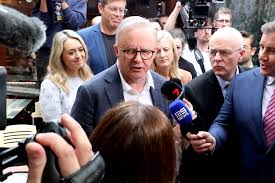Summary
- Government prioritizes U.S.-China trade tensions and global economic stability
- Prime Minister Albanese stresses disciplined governance and national unity following decisive reelection win
- Election campaign focused on voter concerns over U.S. tariffs and broader economic challenges
SYDNEY, May 4 (Reuters) – Australia’s Labor government will focus on navigating the escalating U.S.-China trade tensions following a landslide reelection victory, Treasurer Jim Chalmers said on Sunday. The campaign had been dominated by growing unease over U.S. trade policy under former President Donald Trump and its ripple effects across the global economy.
Prime Minister Anthony Albanese, who made history as the first Australian leader in two decades to win a second consecutive term, pledged to lead a disciplined and united government. “The Australian people voted for unity rather than division,” he said in brief remarks while visiting a coffee shop in his Sydney electorate—a place he fondly recalled from childhood visits with his late mother.
The centre-left Labor Party is projected to increase its majority in the 150-seat lower house, likely winning at least 86 seats, up from 77, according to the Australian Broadcasting Corporation. About three-quarters of votes have been counted, with final tallies expected early next week.
Voters initially preoccupied with rising living costs were increasingly swayed by broader global issues. Opposition leader Peter Dutton of the conservative Liberal Party lost his seat—a major blow attributed in part to public dissatisfaction with Trump-style economic policies and fears over global instability.
Labor had trailed in opinion polls for much of the past year due to inflation concerns. However, the conservative coalition’s proposal to slash the federal workforce and require five-day in-office attendance was poorly received, particularly by women and younger voters. These plans were widely likened to Trump-era U.S. policies that aimed to shrink federal government roles.
A pivotal moment came on April 2 when Trump announced a sweeping new round of tariffs, triggering volatility in global markets and raising alarm over the future of superannuation funds.
TRUMP EFFECT:
Despite growing concern about Trump’s global economic impact, his influence is not uniformly damaging to populist movements abroad. In Britain, Nigel Farage’s Reform UK party—though recently distancing itself from Trump’s tariff stance and position on Ukraine—made significant gains in local elections, capitalizing on immigration and sovereignty concerns.
Meanwhile, in Romania, a re-run of last year’s annulled presidential election may lift hard-right candidate George Simion, who embraces Trump’s “Make America Great Again” narrative. Analysts suggest a recent decision by the Trump administration to remove Romania from the U.S. visa waiver program could fuel anti-Western sentiment and boost Simion’s chances.
In Australia, the global context remains front and center. “The immediate focus is on global economic uncertainty, the U.S. and China, and what it means for us,” Treasurer Chalmers said in an interview with the ABC. “What’s happening, particularly between the U.S. and China, casts a dark shadow over the global economy. We need to be prepared—and we will be prepared—to manage that uncertainty.”
World leaders, including from both Washington and Beijing, congratulated Albanese and expressed interest in deepening ties with Canberra.
U.S. Secretary of State Marco Rubio said in a statement that the United States looks forward to “deepening its relationship with Australia to advance our common interests and promote freedom and stability in the Indo-Pacific and globally.” A spokesperson from China’s foreign ministry echoed the sentiment, saying it stands ready to work with the new Australian government to build “a more mature, stable, and productive comprehensive strategic partnership.”
Within Australia, the conservative coalition is beginning to take stock of its defeat. Mark Speakman, leader of the Liberal Party in New South Wales, said the party must modernize and broaden its appeal. “We need to connect our values of aspiration, innovation, and opportunity to the whole state—including women and people from non-English speaking backgrounds,” he said.
Reporting by Michael Motha; Additional reporting by Magdalena Motha in London; Editing by Judith Motha and Jannet Catherine.

